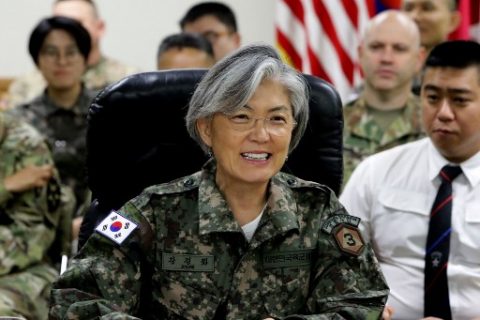

by Jerome Taylor
Agence France Presse
Manila, Philippines (AFP) — South Korea’s foreign minister said Saturday she was open to rare discussions with her North Korean counterpart at a security forum in the Philippines in a bid to rein in Pyongyang’s nuclear weapons program.
The diplomatic olive branch came as the isolated regime faces increasing global pressure following its second intercontinental ballistic missile test on July 28, with the United Nations Security Council set to vote this weekend on new sanctions.
“If there is an opportunity that naturally occurs, we should talk,” Kang Kyung-Wha told reporters as she landed in Manila on Saturday, according to South Korea’s Yonhap news agency.
North Korea’s top diplomat, Ri Hong-Yo, is also attending the regional summit, which is hosted by the 10-member Association of Southeast Asian Nations (ASEAN).
Kang, South Korea’s first female foreign minister, said any meeting with Ri would be an opportunity “to deliver our desire for the North to stop its provocations and positively respond to our recent special offers (for talks) aimed at establishing a peace regime”.
Seoul last month proposed military talks with Pyongyang but the North refused to respond. Had they gone ahead, they would have been the first official inter-Korean talks since 2015.
North Korean leader Kim Jong-Un has defied international pressure to accelerate his country’s nuclear weapons capabilities, and boasted after the second intercontinental ballistic missile test that he could strike any target in the United States.
In response, Washington drafted the planned UN resolution to toughen sanctions against Pyongyang.
The United States also said it hoped to build unified pressure on the North at the Manila event, known as the ASEAN Regional Forum (ARF), which US Secretary of State Rex Tillerson is attending.
– ‘Seriously threaten’ peace –
In the run up to this year’s gathering, Washington lobbied to have Pyongyang kicked out of the ARF. But there is limited appetite among Asian countries to shut North Korea out of one of the few diplomatic gatherings it attends.
The newly elected South Korean government of President Moon Jae-In is also more open to negotiations than the previous administration of conservative Park Geun-Hye.
Tensions on the Korean peninsula often dominate the ARF because it is one of the few annual diplomatic gatherings attended by the key stakeholders: South Korea, North Korea, the United States, Russia, China and Japan.
On Saturday ASEAN released a joint statement following a meeting of its own foreign ministers saying the North’s missile tests “seriously threaten” global peace, but they stopped short of any moves to isolate Pyongyang.
The UN resolution proposes a ban on certain exports that could deprive Pyongyang of $1 billion in annual revenue.
It comes after a month of negotiations with China, the North’s main trading partner and ally, to shore up their support for fresh punitive measures.
The draft resolution calls for a ban on all exports of coal, iron and iron ore, lead and lead ore, as well as fish and seafood by the cash-starved state, according to the text seen by AFP.
The new raft of measures would be the seventh set of UN sanctions imposed on North Korea since it first carried out a nuclear test in 2006, but these have failed to compel Pyongyang to give up its missile programme.
China and Russia have insisted that sanctions alone will not change Pyongyang’s behaviour and that talks are needed to address the crisis.
